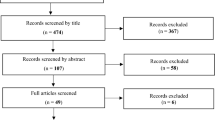Abstract
Indigenous populations are now being encouraged to be involved in the business of gambling as an operator or if not given that status, are actively encouraged to participate in gambling activities. Research both published and unpublished show that different indigenous populations often have a higher prevalence of problem and pathological gambling than other populations groups, especially the dominant population, which actively encourages the normalisation and exposure of vulnerable peoples to gambling. Within this context there are issues for indigenous peoples which vary from one country to another, but irrespective of different government and state policies, there are matters to be considered such as the “voice”, of indigenous peoples in gambling policies, their treaties and ongoing implications, duty of care by politicians and administrators whom licence and regulate gambling, and the long term effects for indigenous people, especially children and young people who are exposed to gambling with no protections in place for their safety.
Similar content being viewed by others
References
Abbott, M. (1999). Gambling and problem gambling in the community: An international overview and critique. Department of Internal Affairs: Wellington.
Abbott, M. (2001). Frequent gamblers and problem gamblers in New Zealand: Report on phase two of the national survey of problem gambling.
Abbott, M., & Volberg, R. (1991). Gaming and problem gambling in New Zealand research series No.12. Wellington: Department of Internal Affairs.
Abbott, M., & McKenna, B. (2000). Gambling and problem gambling among recently sentenced women prisoners in New Zealand report number four of the New Zealand gaming survey. Department of Internal Affairs: Wellington.
Abbott, M., McKenna, B., et al. (2000). Gambling and problem gambling among recently sentenced males in four New Zealand prisons. Department of Internal Affairs: Wellington.
Australian Institute for Gambling Research. (1998). Study of the social and economic impacts of New Zealand casinos. Casino Control Authority: Auckland.
Department of Internal Affairs. (2001). People’s participation in and attitudes to gaming 1985–2000 final results of the 2000 survey. Department of Internal Affairs: Wellington.
Dyall, L. (2002). Kanohi ki te Kanohi: Face to Face A Maori face to gambling. New Ethicals Journal: New Zealand’s Journal of Patient Management, 5(1), 11–16.
Dyall, L. (2004). Gambling : A social hazard. Social Policy Journal of New Zealand / Te Puna Whakaaro, (21), 22–40.
Dyall, L. (2007). Gambling, social disorganisation and deprivation. Intenational Journal of Mental Health and Addictions, (5), 320–330. doi:10.1007/s11469-007-9085-5
Dyall, L., & Morrison, L. (2002). Maori, the Treaty of Waitangi and gambling. Gambling in New Zealand. B. Curtis. Palmerston North: Dunmore.
Dyall, L., & Hand, J. (2003). Maori and gambling: Why a comprehensive Maori public health response is required in Aotearoa. Ecommunity International Journal of Mental Health and Addiction, 1(1), 1–16.
Dyall, L., & Manaia, W. (2005). Powhiri and the Treaty of Waitangi: A Maori protocol framework for host responsibility. Ecommunity International Journal of Mental Health & Addiction Proceedings of the New Zealand International Gambling Conference: 8–14.
Dyall, L., Tse, S., et al. (2007). Cultural Icons and Marketing of Gambling. Int. J Mental Health Addiction DOI 10.1007/s11469-007-9145 http://www.springlink.com/contentbh217561379.
Harris, R., Tobias, M., et al. (2006). Effects of self-reported racial discrimination and deprivation on Maori health and inequalities in New Zealand: cross- sectional study. www.thelancet.com 367(June17): 2005–2009.
Health Sponsorship Council. (2007). Problem gambling mass media campaign- stakeholder feedback June 2007. Wellington: Health Sponsortship Council. unpublished.
International Work Group for Indigenous Affairs (2008). Declaration on the rights of Indigenous People. Retrieved 4 June 2008 http://www.iwgia.org/sw248.asp.
Ministry of Health (2006a). Problem gambling intervention services in New Zealand 2005 Service-user Statistics. Public Health Intelligence Monitoring Report No 8. Wellington.
Ministry of Health (2006b). Problem gambling geography report. Wellington.
National Research Bureau LtD (2007). 2006/7 Gaming and betting activities survey: New Zealanders’ knowledge, views and experience of gambling and gambling-related harm, Health Sponsorship Council.
Productivity Commission Report. (1999). Australia’s gambling industries, report series 10. Productivity Commission: Canberra.
Wardman, D., El-Guebaly, N., et al. (2001). Problem and pathological gambling in North American aboriginal populations: A review of the empirical literature. Journal of Gambling Studies, 17(2), 81–100. doi:10.1023/A:1016699628402.
Author information
Authors and Affiliations
Corresponding author
Rights and permissions
About this article
Cite this article
Dyall, L. Gambling: A Poison Chalice for Indigenous Peoples’. Int J Ment Health Addiction 8, 205–213 (2010). https://doi.org/10.1007/s11469-009-9212-6
Received:
Accepted:
Published:
Issue Date:
DOI: https://doi.org/10.1007/s11469-009-9212-6




